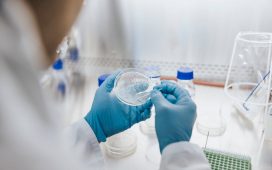Robert F. Bukaty/AP/File
The morning fog lifts beyond the State House, right, in June in Augusta, Maine.
CNN
—
Discussions about the Holocaust, genocide and eugenics could be part of the science curriculum for middle and high school students in Maine as education officials update the state’s learning standards.
A group of educators tasked with reviewing the state’s current science learning standards proposed the inclusion of those topics as discussions. Maine’s education standards are routinely reviewed every five years.
The proposed revisions are also a response to state statutes enacted in recent years requiring the inclusion of Maine Native American history, African American history, and the history of genocide, including the Holocaust, in the state “system of learning results.”
References to the Holocaust, genocide and eugenics were added to the standards relating to biological evolution and heredity.
Marcus Mrowka, a spokesman for the Maine Department of Education, told CNN the topics were included as “additional context and opportunities to encourage critical thinking” to meet the Legislature requirements.
In a life sciences unit for 9th grade students about “Heredity: Inheritance and Variation of Traits,” the proposal suggests teachers should to ask questions about the role of DNA and chromosomes in the inheritance of genetic traits and offers them the following context, “The science of genetics has been used for the purpose of eugenics. We have gained scientific knowledge in this field through unethical human experiments, such as those carried out on prisoners during the Holocaust and the unauthorized use of patient’s cells (for example Henrietta Lacks – HeLa cells).”
The proposed revisions for a middle school learning standard relating to biological evolution said that “Historically, some people have misused and/or applied the ideas of natural selection and artificial selection to justify genocide of various groups, such as Albinos in Africa or Jews in Europe.”
Another addition for the same learning standard on life sciences said “In regards to human evolution, note that misinterpretation of fossil observations has led to the false idea of human hierarchies and racial inequality. Connections include that these misinterpretations led to and were used to justify genocide of indigenous people in Maine and around the world (Holocaust, Rwanda, etc.),” according to a copy of the proposal.
Mrowka said the state does not create or mandate the curriculum for any content area, and local educators are responsible for developing curriculum and learning materials related to learning standards.
The Maine Science Teachers Association, on the other hand, said it supports the current standards and argued against science teachers sharing the proposed content with students.
“While the Maine Science Teachers Association is not philosophically opposed to expanding middle school content in the areas proposed, we believe civics and social studies programming are better suited to delivering the content in question,” Tonya Prentice, president of Maine Science Teachers Association said in a statement to CNN.
“These studies should be handled by educators who are more knowledgeable about the subjects and approach them in such a way that fosters a learning environment that promotes understanding, empathy, and respect for diverse perspectives,” Prentice added.
The current science, technology and engineering standards in Maine were signed into law in 2019 and are “heavily adapted” from the Next Generation Science Standards, the set of common science standards for K-12 students adopted by numerous states since 2013, the Maine Department of Education said on its website.
Mrowka said the proposed revisions were made by two dozen Maine science educators who met several times this summer for the review of the science standards. They also worked with scholars and experts to include the additional content required by the Legislature.
The recommendations were made public in October and were opened to public comment until mid-November. A state Legislature committee will review the proposal in January, Mrowka said.
Several teachers from around the state submitted testimony during the public comment saying they were content with the current standards and asked they would only by modified for “egregious errors.”
Once the standards are approved by the Legislature, the department of education “will provide extensive professional learning for educators,” Mrowka said.
Alison Riley Miller, an associate professor of education at Bowdoin College who was part of the committee reviewing the science standards, said she supports the inclusion of the topics as part of what every student in Maine should understand by the time they graduate from high school, but said she was concerned about the proposed revisions to the standards.
Miller said the statute says topics like the history of genocide must be included in the state’s system of learning results and education officials have misinterpreted it as meaning it should be included in all content areas.
“The question is not if LD 1664 (the statute that prompted the inclusion of some historical events) should be integrated into Maine’s state standards, but rather where these topics should be integrated and who will teach them,” Miller told CNN. “In my experience as a teacher and as a teacher educator, making everyone responsible for teaching a particular topic often results in no one teaching it.”
“So where it is absolutely logical to revise the Maine learning results for social studies to include the history of genocide, it is a much greater stretch to add curriculum related to genocide within the existing science standards, particularly when there is no plan for or funding allocated to the professional learning that would be necessary for science teachers to feel confident teaching a topic of such gravity,” Miller said.








